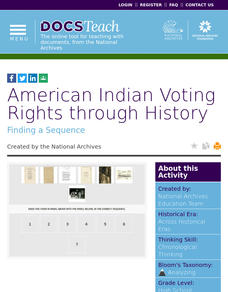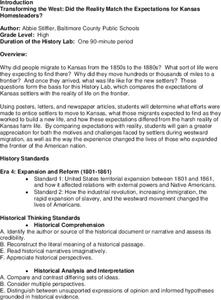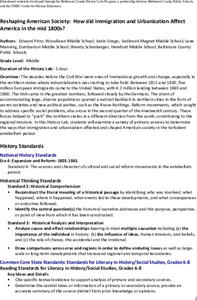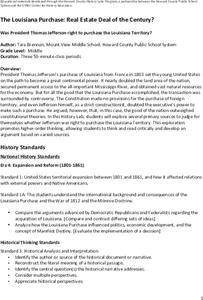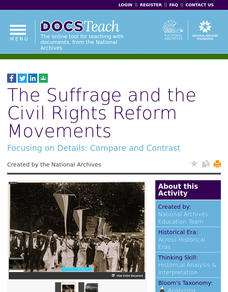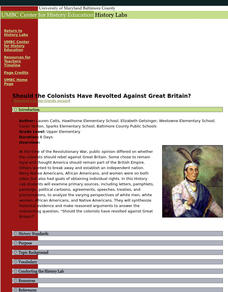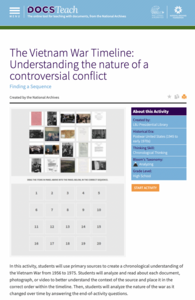DocsTeach
American Indian Voting Rights through History
Vote ... it's your right! An enlightening lesson examines the history of voting rights for Native Americans. Leaners analyze primary documents and place them in chronological order. Academics also create a list of other events that took...
DocsTeach
A Revolution, a Reaction and a Reform: Getting Ready for National History Day
Get ready for National History Day! A thought-provoking activity focuses on a hypothetical project for National History Day (NHD). Academics review three primary sources to determine if they would meet the criteria for a NHD project....
Center for History Education
Transforming the West: Did the Reality Match the Expectations for Kansas Homesteaders?
They expected good soil and hearty crops ... but they found buffalo chips and grasshopper plagues. Using an advertisement encouraging famers to go west, budding historians examine primary sources including letters, photographs, and...
Center for History Education
Reshaping American Society: How did Immigration and Urbanization Affect America in the mid 1800s?
From the Know-Nothings to the Bible Riots, immigration and urbanization changed the face of America in the middle of the 1800s. Using documents that range from immigrant experiences to renderings of violent conflict between immigrants...
Center for History Education
The Louisiana Purchase: Real Estate Deal of the Century?
It's about real estate! Almost overnight, Thomas Jefferson's Louisiana Purchase about doubled the size of the young United States ... but was it constitutional? Using a variety of secondary and primary sources, including Jefferson's own...
DocsTeach
The Suffrage and the Civil Rights Reform Movements
It's the American way to put one foot in front of the other and march. Using images of protests from the civil rights and women's suffrage movements, young historians analyze similarities between the two watershed moments of social...
Newseum
Media Mix-Ups Through History: Analyzing Historical Sources
Scholars use the E.S.C.A.P.E. (Evidence Source, Context, Audience, Purpose, Execution) strategy to analyze a historical source to determine why mistakes happen in news stories. They then apply the same strategies to contemporary flawed...
Center for History Education
Where Did Thomas Jefferson Stand on the Issue of Slavery?
Thomas Jefferson was a complicated man with a complex legacy. Middle schoolers examine a series of primary source documents to gather evidence for an essay in which they answer where Jefferson stood on the issue of slavery.
Simon & Schuster
A Teacher's Guide to 1776 by David McCullough
David McCullough's Pulitzer Prize-winning novel, 1776, is the focus of a 28-page teacher's guide. The guide includes pre-reading questions, background information about key British and American figures, and chapter-by-chapter lessons.
Center for History Education
Should the Colonists Have Revolted Against Great Britain?
Should the Americans have taken the plunge and revolted against Great Britain? Using documents, including the famed Common Sense and a Loyalist response, pupils conduct a lengthy investigation of the question. The interesting resource...
Simon & Schuster
Curriculum Guide to: A Tale of Two Cities by Charles Dickens
A Tale of Two Cities is the core text for five lessons in a Curriculum Guide for Charles Dickens' famous novel. To begin, scholars examine Dickens' use of anaphora in the first line of the novel. Next, they compare the point of view in a...
DocsTeach
Ernest Hemingway: Life and Works
An interactive activity asks scholars to match the title of an Ernest Hemingway novel with one of seven photographs.
DocsTeach
Around the World with Ernest Hemingway
Ernest Hemingway was a traveler and added evidence of these travels to his works. An engaging activity asks readers to analyze 20 photographs of the author, then drag the images to the correct location on an interactive map.
DocsTeach
The Process of Early Space Flight: The Gemini Program
Ideas take flight in an exciting activity on the NASA Gemini Program. Young scholars analyze photos from NASA's Gemini Program and place photos in the correct sequence of events. Academics also discuss the program and how the steps to...
DocsTeach
The Space Race: Project Mercury
Race to the moon! An engaging activity focuses on NASA's Project Mercury and the Space Race. Scholars read a memorandum regarding the project and explore how it fueled Cold War tensions. Academics complete a worksheet and discuss the...
DocsTeach
The Path of Justice: Selma and the Voting Rights Act
The civil rights movement: An ongoing battle for change. The activity focuses on President Johnson's speech in response to the massacre at the Selma March. Academics study the speech, complete a hands-on-activity, and discuss President...
DocsTeach
The Impact of Bloody Sunday in Selma
Who is to blame when a peaceful protest turns deadly? Scholars research the impact of the civil rights march in Selma, better known as Bloody Sunday. The activity uses files from the FBI's investigation to help academics understand the...
DocsTeach
The Civil Rights Act of 1964 and the Equal Employment Opportunity Commission
1964: A victory for the civil rights movement! Scholars read a section of the Civil Rights Act of 1964 and discuss what affirmative actions means to them. The resource is a jigsaw activity, with each group focusing on one section of the...
DocsTeach
Responding to the Murder of Harry T. Moore
Heroic civil rights leader Harry T. Moore is murdered! An eye-opening activity delves into the past to understand the murder of prominent civil rights leader and educator Harry Moore and his wife. Academics also read President Truman's...
DocsTeach
Martin Luther King, Jr. and the Fight for Civil Rights
Find clues to the past with photos! Young historians use a photo from one of Martin Luther King Jr.'s peaceful protests to practice photo analysis. Academics look at the image to gain clues about what is happening and why. To finish,...
DocsTeach
Integration of the US Armed Forces
Uncle Sam wants you to integrate the military! The activity uses images and documents to help scholars understand the integration of African Americans into the mainstream military. Academics analyze a series of military photos and...
DocsTeach
The Vietnam War Timeline: Understanding the Nature of a Controversial Conflict
The story of the Vietnam War is often told through images. Young historians analyze images and primary sources —including the Vietnamese Army's Seven Commandments poster and photos of the daily life of soldiers—to construct a timeline of...
DocsTeach
We Shall Overcome: March on Washington
Unlike most children, Edith Lee-Payne of Detroit went to the March on Washington with her mother to celebrate her 12th birthday. Pupils walk the march with her by analyzing a closeup image of her that has come to represent the pivotal...
DocsTeach
The War in Vietnam - A Story in Photographs
The Vietnam War was the first war to come into American living rooms with its images of American soldiers fighting in jungles far, far away. Young historians analyze and curate photos from the conflict, deciding how they would create a...


